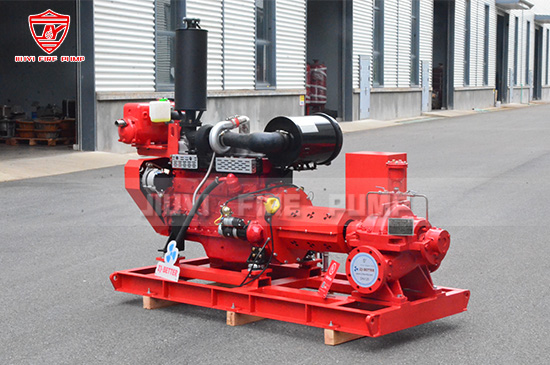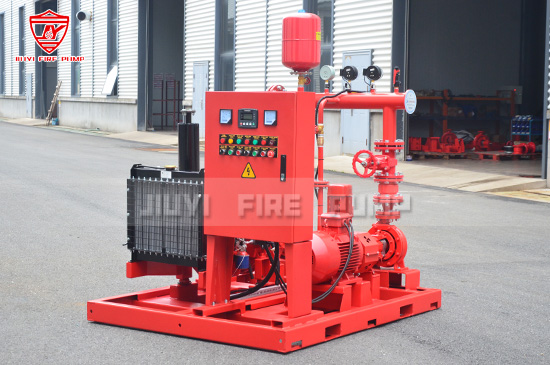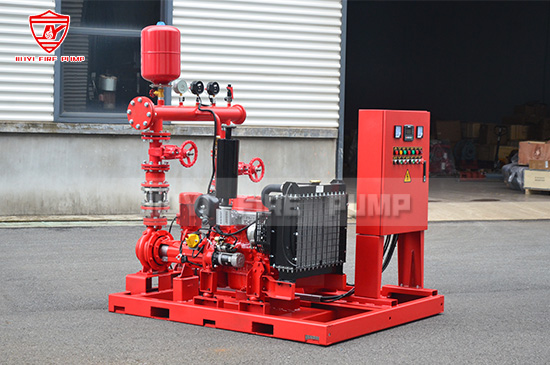Fire pumps are vital components of any fire protection system. They are designed to ensure a continuous supply of water to extinguish fires, especially in high-risk areas. A fire pump is driven by an engine or motor, and the choice of the driver plays a crucial role in the reliability and efficiency of the system. While electric motors are the most commonly used drivers for fire pumps, the second most used driver is often overlooked – the diesel engine.
In this article, we will explore why diesel engines are the second most popular driver for fire pumps, their benefits, and considerations for choosing the right one for your fire protection system.

Before diving into the second most used driver, it's important to understand the two main types of drivers used in fire pump systems: electric motors and diesel engines.
Electric Motors:
Electric motors are the most commonly used drivers for fire pumps. They are preferred because of their reliability, efficiency, and relatively lower cost. When connected to a power supply, electric motors can provide continuous operation. They are often used in buildings where reliable grid power is available.
Diesel Engines:
Diesel engines, on the other hand, are typically used as a backup in cases where electric power is not available or when the power supply is unreliable. They can function independently of the electrical grid, making them ideal for remote locations or facilities with unreliable electricity.
Despite electric motors dominating the market, diesel engines come in as the second most used driver for several reasons:
Independence from the Power Grid:
Diesel engines are completely independent of the power grid, meaning they can operate even when there is a power failure. This makes them ideal for critical facilities such as hospitals, power plants, and industrial sites, where maintaining water supply for firefighting is crucial during emergencies.
Reliability in Remote Locations:
Many remote locations, such as mines, offshore platforms, and large construction sites, may not have access to a stable or reliable power grid. Diesel engines are often used in these cases to ensure the fire pump operates independently, without relying on external electrical sources.
High Power Output:
Diesel engines are well-known for their high torque and power output. This makes them suitable for large-scale fire protection systems where higher water pressure is required to combat fires effectively. The reliability and performance of diesel engines in high-demand situations make them a popular choice.
Cost-Effective for Large Systems:
Diesel engines tend to be more cost-effective when it comes to powering large fire pump systems. While the initial cost may be higher, the ongoing operational costs are often lower than electric pumps, particularly in areas with high electricity tariffs.
Easy Maintenance:
Diesel engines are relatively simple to maintain and repair, especially compared to electric motors. With regular servicing, a diesel engine can last for many years, making it a durable choice for fire protection systems in industries where downtime is not an option.
Not all diesel engines are the same, and the choice of engine type can influence the overall performance and efficiency of the fire pump. Here are some of the most common types of diesel engines used:
Water-Cooled Diesel Engines:
These engines are cooled by a water jacket system and are commonly used in fire pump systems due to their ability to handle high operating temperatures and maintain consistent performance. They are typically quieter and more efficient in terms of fuel consumption.
Air-Cooled Diesel Engines:
These engines rely on air to cool the engine and are generally lighter and more compact than water-cooled engines. While they may be slightly less efficient, they are well-suited for fire pump applications in smaller or more confined spaces where water cooling might not be feasible.
Turbocharged Diesel Engines:
Turbocharged diesel engines offer enhanced power output and fuel efficiency by forcing more air into the engine for better combustion. They are often used in large-scale fire pump systems where high pressure and large volumes of water are needed.
In addition to being the second most used driver, diesel engine-driven fire pumps offer several key advantages:
Autonomous Operation:
Diesel engines do not rely on an external power source, which ensures they can continue operating in the event of a power failure. This autonomy is a critical factor in ensuring that fire pumps can deliver water during emergencies, regardless of external conditions.
Durability:
Diesel engines are known for their rugged durability, making them ideal for environments where fire pumps are subjected to harsh conditions. Their resistance to wear and tear and long operational lifespan make them a wise investment.
Compliance with Safety Standards:
Diesel engine-driven fire pumps often meet stringent fire safety and regulatory standards. In many jurisdictions, fire pumps driven by diesel engines are required for certain types of facilities, especially where there is a higher risk of power outages.
Fuel Availability:
Diesel fuel is widely available in most parts of the world, which makes diesel engine-driven fire pumps a convenient choice, especially in areas with unreliable access to electricity.
Fuel Efficiency:
Diesel engines are typically more fuel-efficient than gasoline engines, providing longer operation times before needing to refuel. This is especially important in fire emergencies, where continuous operation can be crucial.

While diesel engines offer many advantages, there are also several factors to consider before selecting them for your fire pump system:
Fuel Storage and Maintenance:
Diesel engines require an adequate fuel supply and regular maintenance. This includes checking the fuel level, ensuring proper lubrication, and monitoring exhaust systems. Additionally, you will need to have a fuel storage system in place for emergencies.
Environmental Impact:
Diesel engines produce emissions, and in some areas, there are regulations surrounding their environmental impact. It's important to assess the emissions levels of your diesel engine and consider options such as exhaust scrubbers or more environmentally-friendly alternatives.
Initial Cost vs. Operational Cost:
While diesel engines may have a higher initial cost than electric pumps, their operational costs over time can often be lower. It's essential to weigh these factors when making your decision.
Noise Level:
Diesel engines tend to be noisier than electric motors, which may be a consideration in certain environments where noise reduction is a priority.

Diesel engines are the second most popular choice for driving fire pumps, and for good reason. Their ability to operate independently of the power grid, their high power output, and their reliability in remote locations make them indispensable in many fire protection systems. By understanding the advantages and considerations of diesel engine-driven fire pumps, you can make a more informed decision about the right driver for your fire protection needs.
Whether you're looking for backup solutions or require a reliable power source for large-scale systems, diesel engines remain an excellent choice.